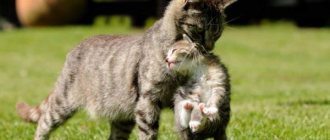The first thing a veterinarian does during a clinical examination of an animal brought to him is to look into the mouth. And this is not surprising: the condition and appearance of the tongue can be used to judge the health of the animal. A change in color, the appearance of plaque, ulcers, wounds on the mucous membrane indicate the beginning of the pathological process.
But the article does not talk about the structure of this amazing organ; we are interested in the question, for what reasons can a cat stick out its tongue? If we think globally and as closely as possible to science, then there are two factors by which the tongue can extend beyond the boundaries of the oral cavity:
- the first is physiological, when there is no reason to worry and such behavior is the norm;
- the second is pathological, when it is necessary to urgently and immediately pay attention to the health of your furry pet.
Physiological reasons for a cat's tongue sticking out
If a cat sticks out its tongue, this is not always a sign of ill health. Cats behave in a similar way during childbirth, and cats sometimes open their mouths and stick out their tongues during sexual estrus. The tongue may stick out slightly from the mouth when cats are caught unawares (for example, the owner discovers the animal eating food from the table, or if the pet, jumping carelessly, breaks a flower pot).
Overheat
Since almost the entire body area of cats is covered with fur, their ability to assess temperature is poorly developed. If overheated, the animal's hair will not be able to act as a thermostat, and the evaporation area will simply not be enough to lower the temperature parameter. There is a need to increase the area of evaporation, which is why the cat pulls out its tongue. Sometimes the animal lies down on the ground and completely relaxes, this contributes to a better cooling process.
Physiological reasons
Veterinarians identify the reasons why a cat sticks out its tongue:
- Relaxation. During rest and sleep, the jaw muscles are maximally relaxed, which leads to prolapse of the muscular organ.
- Thermoregulation. If a cat is hot, it sticks out its tongue, thereby trying to normalize the temperature.
- Absent-mindedness. A cat may simply forget to retract its tongue after licking fur or active games.
- Bite. Due to malocclusion, the tongue simply does not fit in the cat’s mouth. That's why it sticks out. Such pets do not qualify for participation in competitions and exhibitions based on their appearance.
- Childbirth. Before the expected birth, the cat's behavior changes. She becomes excited, her breathing quickens, her mouth is slightly open, her tongue sticks out.
- Praise. The cat sticks out its tongue in response to praise. If the owner is constantly touched by the sight of a cat with a hanging tongue, then the animal will systematically carry out such an action for the sake of approval.
- Hunting. When hunting, cats involuntarily stick out the tip of their tongue. This is due to the fact that in this position of the muscular organ the animal’s sense of smell increases.
- Age. A cat who has crossed the age of 8 may have loose teeth and fall out. From the cracks that appear, the tongue freely looks out of the oral cavity.
Interesting fact: scientists were able to prove that a cat’s tongue grows by several millimeters during sleep. Therefore, during rest, the owner may notice the tip of the pet’s tongue sticking out.
Additional symptoms
The reasons why a cat opens its mouth and breathes like a dog with its tongue hanging out are:
- Physiological, when rapid breathing is caused by natural processes in the body.
- Pathological, in which the cat breathes with its mouth open due to illness or injury.
Sometimes, during difficulty breathing, the pet may experience pain. Externally, this manifests itself as the following signs:
- the cat looks excited and scared;
- the muzzle is stretched out in an unusual grimace;
- pupils dilated;
- the tail is pressed to the body;
- mustache pressed;
- the animal is aggressive.
Heavy belly breathing is a sign that your cat is not feeling well. It looks as if the pet is trying to inhale air with its stomach and push it out when exhaling. This type of breathing is called abdominal.
Normally, the abdominal muscles should not be used. When healthy, there is a vacuum in the sternum around the lungs. It allows the lungs to expand when inhaling.
In addition to belly breathing, lethargy, aggression and the inability to stand up are dangerous symptoms.
The cat opens its mouth and breathes like a dog: reasons
There are also pathological reasons that require doctor's intervention.
The cat opens its mouth and breathes like a dog, reasons:
- If you notice that your cat's rapid breathing with an open mouth and protruding tongue is in no way associated with stress or increased ambient temperature, observe how long this happens.
- It is necessary to pay attention to the accompanying symptoms. These may include vomiting, nausea, loss of coordination, and wheezing. In most cases, cats inhale this way when foreign bodies enter the respiratory tract.
- It could be wool or food debris. This often happens if a pet eats very quickly and tries to get enough quickly.
Pet
When a cat with its tongue hanging out is healthy
Several variations are possible that do not pose a threat to health when the rough tongue is removed from the mouth of an adult or kitten:
- If a cat was cleaning itself by licking its fur, and was distracted by something interesting, for example, a bird flew past or the owners carried food past, he may well forget to hide his tongue and sit, looking into space, looking extremely stupid, and for quite a long time. If the cat is active, eats well, and plays, then nothing bad is happening. She just likes to walk like that.
- Another situation when a cat’s tongue sticking out is the norm is during childbirth. Here the cat has the right to breathe heavily, its body is doing difficult work and its muscles need more oxygen. Observe your pet carefully during labor, but without fuss. Additionally, you may need the help of a veterinarian or a trip to the clinic if labor stops and a caesarean section is required.
- A cat has the right to stick out the tip of its tongue when sleeping , especially deeply. This is a muscle that when it relaxes, it becomes longer. For those who are awake, it is constantly in good shape.
- A simple explanation can also be found when cats stick out their tongues after operations: the anesthesia includes drugs that relax the muscles. Their effect will stop within a day, but in the meantime, you should carefully moisten your pet’s mouth with water.
- Cats may stick out their tongues when flirting with the opposite sex. Moreover, it is not necessary to be nearby; males can smell females in heat 5 kilometers away.
The animal may be “teased” - stress, especially if the cat reacts to an unfamiliar environment, is accompanied by profuse drooling.
Possible diseases
In some cases, a tongue falling out of the mouth is a reason to worry.
How an animal behaves in case of illness Sometimes cats stick out their tongues and breathe like dogs due to diseases such as rhinitis, ARVI, tracheitis, pneumonia and bronchitis.
The main signs of the disease are difficulty breathing, coughing, wheezing when inhaling and exhaling, wheezing, lack of appetite, and nasal discharge. Temperature may also rise and apathy may appear. We suggest you read: Why does a cat eat cabbage?
Poisoning
Cats may sit with their tongue hanging out if their body is intoxicated. Animals may experience symptoms such as disturbances in the functioning of the respiratory tract and coordination, excessive salivation, vomiting, diarrhea, tremors, dilated pupils, and convulsive muscle contractions. Usually in this state the cat feels increased anxiety or complete apathy.
Infections
A protruding tongue can be observed in cats in the case of infectious diseases such as rhinotracheitis, chlamydia and calcivirosis. In this case, animals may exhibit the same symptoms as in the case of respiratory disease. In addition, pets may have bowel movements and purulent discharge from the nose and eyes. The infection can also cause swelling in the mouth, causing the tongue to fall out of the mouth.
Important! If the cat begins to show aggression, it has profuse salivation, an open mouth and bulging eyes, then this may indicate the presence of rabies.
In the case of an infectious disease, the animal also behaves strangely
Tumors
Oncology of the oral cavity is one of the most dangerous causes of a protruding tongue. If there is plaque, bleeding, bad breath, a hoarse voice, problems chewing or swallowing, or painful mouth ulcers, your pet needs immediate medical attention.
Note! A cat can stick out its tongue not only due to a malignant tumor, but also in the case of polyps located in the oral cavity.
Such a serious illness as heart failure is often accompanied by pulmonary edema. This causes the cat to try to breathe from its belly rather than from its chest, with its tongue usually sticking out. Signs of this disease are a weak appetite or its complete absence, the tongue and gums acquire a blue tint, a distinct hoarseness appears when breathing, the heartbeat quickens, coordination of movements is impaired, the work of the hind legs is not always synchronous, some of the receptors may be paralyzed. Cats may also stick out their tongue due to conditions such as ischemia, angina, and hypertension.
IMPORTANT: if the kitten always walks with his tongue sticking out
The most common case of a “safe” protruding tongue tip is in tired kittens. Having played enough, kids often fall asleep with the edge of their tongue sticking out. In this case, there is no need to worry, especially if there is no excessive salivation as an accompanying factor.
..., if no symptoms are detected, take the baby to the veterinarian. Perhaps your cat has an incorrect bite, and then it is very important to monitor the cat’s drinking, because you cannot allow the tissues of the tip of the tongue to dry out.
An adult cat can sometimes “freeze” when washing itself. Distracted by something more interesting than hygiene, an adult cat may forget to remove its tongue. This usually doesn’t last long; the cat will either continue to wash itself or go to look at the reason that distracted its attention.
Also, an adult cat in the heat or after active games and activities can fall asleep like a kitten with the tip of its tongue slightly sticking out. This is how the animal cools the blood through external cooling of the tongue and saturates it with oxygen spent on activity. Therefore, if a cat sleeps with its tongue hanging out and does not drool or foam, there is no need to worry.
The cat also sticks out its tongue a little in a relaxed, peaceful state. Not all individuals do this, but those cats that like to lounge on their laps or a particularly comfortable ottoman often do not control the tongue muscle from pleasure and extreme relaxation. And of course, the relaxed organ falls out of the mouth a little.
Causes for concern
If mom and dad notice that the baby is constantly opening his mouth, sticking out his tongue, you need to visit a specialist. Let's talk about the most common ailments that accompany the “bad habit.”
Frenum defects
About a third of all newborns have a short frenulum. This pathology is called ankyloglossia. It occurs much more often in boys than in girls. A mucous membrane connects the tongue to the floor of the mouth. It is either not attached correctly (starting from the middle) or is less than 8 mm in size. Causes of pathology:
- mother's age (over 35 years);
- diseases and stress during pregnancy.
If the pediatrician diagnoses ankyloglossia, a minor cosmetic surgery is performed and the frenulum is trimmed. The newborn does not feel pain, the process is not accompanied by anesthesia. Timely intervention will help avoid problems with breastfeeding, speech defects, and discomfort for the baby.
Problems with the gastrointestinal tract
Most often these include gastritis, constipation, and high acidity. Thus, a reaction to early introduced complementary foods may occur. There is no need to panic, but if you notice that colic and bloating are accompanied by mouth opening, see your pediatrician.
With otitis media, sinusitis, and rhinitis, the nasal sinuses are clogged with mucus. The baby is forced to breathe through his mouth. This is especially noticeable during sleep. If you observe that, in addition to opening the mouth, the baby:
- watery discharge from the nose appeared;
- sneezing does not stop;
- noises are heard when breathing;
- increased temperature;
- there were difficulties with feeding;
- a cough developed.
Most likely, the child involuntarily pulls his hands towards the sore spot (nose, ear). Don't hesitate to see a doctor. Inflammatory processes not only cause pain and discomfort to the baby, but can also lead to irreversible loss of smell and hearing. Contact an ENT specialist, he will quickly make a diagnosis based on an external examination and analysis of mucosal secretions.
Muscle weakness
If a newborn periodically opens his mouth in his sleep in the absence of other symptoms, there is no need to sound the alarm until the child is six months old. The phenomenon is not a serious pathology; as a rule, it goes away on its own. The habit should not be left unattended. This may lead to increased salivation in the future. The disease is treated with massage courses, sometimes with injections of drugs for tone.
Hypothyroidism
Thyroid dysfunction. In addition to prolapse of the uvula, jaundice, an increase in body weight and head circumference are added. Appetite may be reduced. Drowsiness and constipation are noted. The child cries hoarsely. It is necessary to show the baby to an endocrinologist. He will take the necessary tests (blood for the hormones TSH, T4, biochemical urine), perform an ultrasound of the thyroid gland, and palpate it.
Facial muscle atrophy
With pathology, the child experiences the so-called “flaccid child syndrome.” Normal muscle tension, including facial muscles, decreases, as a result of which the tongue falls out during sleep. The baby's face resembles a mask. He does not smile or grimace, like most healthy children of this age. The skin is dry, with spider veins. The screams are sluggish, weak, muffled. Strabismus may develop. Additionally observed:
- drooping eyelids;
- facial asymmetry;
- excessive swelling of the lips;
- absence of natural folds on the skin.
The reasons are:
- congenital partial loss of skin;
- birthmarks;
- hemiatrophy of the facial skin.
Consultation with a pediatrician is required. He conducts an external examination, palpation, collects the mother’s pregnancy history, takes the necessary blood tests, and examines the lists of medications that were given to the baby. MRI and CT are used as additional diagnostics. The disease is treated with medication. Massage is often prescribed.
Candidiasis
A whitish coating on the gums, the surface of the tongue, and on the mucous membrane of the cheeks indicates a possible thrush. The Candida parasite provokes unpleasant sensations and causes discomfort. To make this clear to the parents, the child opens his mouth every now and then. Associated symptoms include loss of appetite, sleep disturbance, and frequent crying. Causes:
- weak immunity;
- dry indoor microclimate;
- mother's illness.
Diseases can be provoked by frequent regurgitation, mechanical injuries to the mucous membrane, and treatment with hormones. This is an inflammatory process that requires immediate treatment. The pediatrician takes a swab from the oral cavity, identifies the growth of fungal flora, and prescribes antibiotics and antifungal drugs. It is recommended to increase the humidity in your child's bedroom using a humidifier.
Stomatitis
Small ulcers affect the inner surface of the cheeks and gums, causing pain and injury. Therefore, the child tries to stick out his tongue. The disease occurs due to:
- injuries to the mucous membrane (in newborns it is thin and easily damaged);
- exposure to germs (with a pacifier, toy);
- low immunity;
- underdevelopment of the aseptic properties of saliva.
With stomatitis, in addition to opening the mouth during sleep, the child experiences:
- ulcers and white plaque on the gums;
- swelling and redness of the mouth;
- increased body temperature;
- bad breath;
- restless sleep.
First of all, you need to show the baby to the pediatrician. Depending on the advanced stage of the disease, he may additionally refer you to a pediatric dentist, immunologist, or infectious disease specialist. To diagnose the disease and exclude the possibility of other diseases, a smear is taken from the baby’s oral cavity. Treatment is carried out with medication, with accompanying treatment of the mucous membrane with decoctions and special ointments.
If a child constantly opens his mouth in his sleep and has difficulty breathing through his nose, it is necessary to show him to an ENT doctor
Intracranial pressure, like blood pressure, fluctuates depending on the toddler’s activity and time of day. But there are pathologies in which overestimated values of the indicator are observed. These include:
- tumors;
- hematomas;
- inflammation of the brain and central nervous system;
- injuries;
- improper circulation of lymph in the cerebral cortex.
Non-professional doctors often make this diagnosis. But it is important to understand that this is not an independent disease that can be cured with pills. A neurologist is consulted, who prescribes an ultrasound or MRI with contrast to identify the cause. If there have been injuries, there is a suspicion of a tumor, the child has suffered a severe infection, his mouth is constantly opening, his fontanel is protruding, his skull circumference is larger than normal, it is necessary to urgently visit a doctor.
Hypotonicity
Disturbance in the supply of neural signals from the brain to the facial muscles. As a result, the tongue often falls out of the mouth; its structure is loose. The child not only controls the organ poorly. Parents notice that the child does not want to roll over, does not try to get up, and does not sit well. He draws his legs in and hangs by his arms.
- general drowsiness;
- poorly developed sucking reflex;
- slow weight gain;
- lack of emotions.
Hypotonia can be caused by incorrect delivery. For consultation they are referred to a pediatrician or neurologist. The diagnosis is made on the basis of ultrasound. The necessary medications and vitamins (calcium, magnesium) are prescribed, in addition, physiotherapy (massage courses) is prescribed. Constant monitoring by a specialist is required to completely overcome the disease.
We hope that thanks to our material you have figured out the reasons for your baby’s tongue sticking out. In most cases, this habit does not mean anything, it is how the child learns about the world or is shown to the parents something. But if you notice alarming accompanying symptoms, consult a doctor immediately. Be healthy!
- Orange coating on the tongue causes - ProfiMed
How to determine whether it is normal or not
The cat sticks out the tip while sleeping - this often happens when the animal is relaxed and lying on its back, paws folded, sleeping.
This behavior is natural and only causes affection for the owner. It often remains protruding even after washing. While licking fur, the animal is in a calm, relaxed state, so the tongue becomes longer and protrudes slightly from the mouth.
Often the beauty simply forgets to put her tongue back in place, and for some time pleases those around her with her funny appearance.
Owners of these graceful, beautiful animals should be attentive to the health of their pets, know the characteristics of the breeds and natural habits. All this will help to distinguish normal behavior from pathology and begin treatment on time.
Cats have long become an integral part of our lives. Having taken a tiny kitten into the house, looking with tenderness at the serenely sleeping fluffy ball, the new owner will definitely invite everyone to admire the baby, who sleeps like a baby, sticking out his pinkish tongue. The Internet is teeming with pictures of such cute pictures.
- A protruding tongue is not always the norm.
After washing: the cat often forgets to remove her tongue, which she used as a sponge for hygiene procedures for 10-20 minutes. These animals tend to freeze, as if meditating, after washing, so the tip of the tongue sticking out in such cases can be considered the norm.
- Relaxed state: Since the tongue is a muscular organ, it lengthens in a relaxed state. When a cat sleeps calmly and soundly, not only does its entire body stretch, its tongue also becomes larger, not fitting into the oral cavity. And this is also the norm.
- Stress: not only dogs, but also cats, when under stress, begin to breathe more often, sticking out their tongues - in this way they facilitate the passage of air through the respiratory tract, saturating the tissues with oxygen.
- High air temperature: Like dogs, cats use their tongue to cool themselves because, unlike humans, they do not have sweat glands. Cats stick out the tip of their tongue when it's hot - and this is completely normal. At extremely high temperatures, you need to help her avoid overheating: bring her into a cool room, under an air conditioner or next to a fan.
Under certain circumstances, the language that cats use to tease us can be considered normal. If there are no warning signs and the pet is otherwise behaving as usual, there is no need to rush to the veterinarian. You just have to make sure there are no other pathological manifestations. However, if the tip of a rough “sponge” is constantly visible between the cat’s teeth, you still need to consult with specialists.
Often, cat owners observe a picture of their pet sticking out the tip of its tongue. Veterinarians identify two reasons why cats walk or sleep with their tongues hanging out.
This may be a physiological factor, when there is no reason for concern, and such behavior is considered normal.
But it can also be pathological, when you should pay attention to the pet’s health and how to contact a veterinarian as soon as possible.
- 1. In what cases is this the norm?
- 2. Diseases that cause cats to stick out their tongues
There are a number of reasons why a healthy cat sticks out its tongue. These reasons should not be a cause for concern:
- 1. Forgetfulness. This happens when the cat has finished its hygiene procedures and forgot to hide its tongue.
- 2. Relaxation. Often, owners observe a sleeping pet's tongue sticking out. This is not surprising, since when an animal sleeps, all its muscles lose tone. This is the reason for this phenomenon. In this case, this is the norm and there is no need to worry.
- 3. Attracting attention. The opinion that cats are not prone to self-learning is incorrect. If the cat noticed that the owner laughed or smiled at the sight of her tongue sticking out, she will want to repeat this again to attract attention.
- 4. Flirting. Sexually mature adults do this to attract the attention of the opposite sex. It has been observed that a cat sticking out its tongue arouses the cat's interest faster than its competitors.
- 5. Bite. Some breeds, such as Persians, have altered jaw structure. The front teeth of such breeds are located in such a way that they interfere with the tongue, so it protrudes outward.
- 6. Thermoregulation. When it's very hot, cats, like dogs, stick out their tongues to cool off. But for cats this is a bad sign. If this happens from the heat, then this indicates severe overheating, even the threat of heat stroke. In this case, the animal must be urgently taken to a cool place, given a drink of water and sprinkled with water.
- 7. Stress. When in a stressful situation, your pet will often lick itself or pant with its tongue hanging out like a dog.
- 8. Childbirth. If the cat is heavily pregnant, this phenomenon often indicates that labor is beginning.
We recommend
Why do cats carry dead animals home: scientific research and observations
It happens that a cat whose tongue sticks out is seriously ill with one of the following diseases:
- 1. Stomatitis. With this disease, ulcers appear on the mucous membrane of the mouth, which are very painful. The pain intensifies if the diseased organ touches the palate and the inner surface of the teeth. To somehow relieve the pain, the pet sticks out its tongue. This condition requires urgent treatment. The inflammatory process causes indigestion and loss of appetite. Ulcers are also a gateway for bacteria to enter and cause infection.
- 2. Tartar. This is plaque on the teeth that has turned into a dark growth. Symptoms other than a protruding tongue include bleeding gums and putrid breath.
- 3. Respiratory diseases. Such diseases cause difficulty breathing in your pet. If a cat's nose is clogged with mucus, in order to ensure normal flow of air into the lungs, he must inhale deeply and often through his mouth, and the animal must keep its tongue outside the oral cavity. A pet’s tongue may also fall out during coughing. Most often this happens with rhinitis, sinusitis, bronchitis, throat diseases, and pneumonia. A signal to contact a veterinary clinic is that, in addition to a protruding tongue, the cat has a cough or nasal discharge.
- 4. Impaired cardiovascular activity. With diseases of this kind, the animal necessarily has shortness of breath, that is, a disturbance in the rhythm and frequency of breathing. Symptoms of this disease are that the cat breathes heavily and frequently and hardly moves. In this case, you should immediately contact a veterinarian.
- 5. Poisoning or indigestion. In such cases, cats often vomit, during which the pet begins to choke, cough, and his tongue sticks out. As a result, the process ends with the eruption of its contents from the stomach.
- 6. Functional disorders of the brain. Due to any disorders of the nervous system, traumatic brain injury, stroke, or infectious lesions, the cat may not be able to control the position of its body in space. In addition to her tongue sticking out, she may have convulsions, squint and other nervous phenomena.
READ Structure of the horse's stomach: digestive system, mucous membrane and its zones
If a cat sticks out its tongue, you need to carefully observe it to determine why this is happening. This will help, if necessary, to provide assistance to your pet and preserve her health or even life.
Veterinarians will name many pathologies in which a cat sticks out its tongue. However, we are not necessarily talking about illness. Do not panic ahead of time if you notice strange behavior in your pet. There are many situations in which a cat’s tongue sticking out is normal. Among the most common are the following:
- The animal is as relaxed as possible. As a rule, this happens during sleep. The tongue, like any muscular organ, should also rest. After all, it already has a lot of functions that tire it. During relaxation, the cat's tongue becomes slightly longer than when it is tense. So it sticks out of the mouth. This feature is unique to pets. Cats living in the wild cannot afford to relax for a second. They are tense even in their sleep, and they always keep their tongues shut.
- Cats stick out their tongues because of the heat. The pet's heat exchange has been disrupted. It is urgent to give him something to drink and move him to a cool place if the cat is in the sun. Without doing this, you can bring the animal to heatstroke.
- Malocclusion is another common reason for a cat sticking out its tongue. The abnormal structure of the jaw is to blame, in which it is shorter than necessary; the organ simply does not fit in the mouth. Malocclusion is common in artificially bred elite breeds. Sometimes this becomes a real shock for cat owners who dream of world fame for their pet. After all, with such a defect, an animal, even if it is of royal blood, will not be able to participate in exhibitions and other prestigious events.
- Another reason is simple forgetfulness. The cat sometimes just gets distracted. Periodically forgets to hide his tongue even after hygiene procedures. This happens, for example, when she was washing her face and the owner called out to her. The cat turned around, but didn’t have time to hide his tongue. As a result, the cute photo is ready.
As you know, cats are very smart and quick-witted animals. Many of them are well trained, and Kuklachev’s wards are an example of this. So, some cats, having stuck out their tongue involuntarily a couple of times and noticing that the owner was delighted, can then do this on purpose in order to attract the precious attention of the owner and other people.
To determine whether it is normal for a cat to show its tongue, veterinarians recommend touching the tip of the tongue with your finger. If the animal immediately “corrects the situation,” most likely there is nothing to worry about. If the tongue does not hide or appears again soon, the cat may have health problems. You need to take a close look at your pet. Examine every centimeter of his body:
- before;
- butt;
- sides;
- oral cavity;
- ears;
- tail;
- paws.
Why does a cat stick out its tongue and breathe frequently?
Frequent breathing with an open mouth can be caused by hair getting into the respiratory tract.
Why does a cat stick out its tongue and breathe quickly?
- Cats can lick and preen themselves for a long period of time, so the hairs get into the respiratory tract.
- In this case, the animal may begin to cough and vomit.
- In most cases, nature provides that the pet simply gets rid of some of the fur from the respiratory tract and intestines by vomiting.
Kitten Heavy breathing with a protruding tongue is often observed if the cat has broken ribs.
Perhaps this happened during an active walk, or pampering. Cats, despite their plasticity, can also fall and break ribs. The cat is breathing with its tongue hanging out, what to do:
- In this case, take a closer look at the deformation of the chest and the presence of other injuries. However, there may be more serious symptoms, which are indicated by heavy breathing with an open mouth.
- If your pet has a cold, mucous may accumulate in his nose. That is why breathing through the nasal passages is impossible, so the cat inhales through the mouth.
- It is necessary to treat a cold in an animal. The infection can spread from the upper respiratory tract to the lower. Therefore, it is necessary to prevent the occurrence of bronchitis or pneumonia.
The kitten is tired. Often the cause of an open mouth can be estrus, or sexual heat.
At this time, hormones are raging in females and males, a huge amount of them is released into the blood, which can increase blood pressure and increase breathing. So don't be surprised if your cat is in heat and breathes through her mouth with her tongue hanging out. Why does a cat breathe frequently during heat:
- But there can also be very serious reasons for a cat breathing through its mouth. Among them are oncological diseases. There may be a cough with mucous, purulent and bloody discharge. In this case, you need to consult a doctor.
- Scientists have proven that obese cats can also breathe with their mouths open. Just as fat people experience shortness of breath and heavy breathing due to obesity, the same thing happens in cats. It is difficult for them to perform even the simplest physical activities, which in turn leads to heavy breathing, the cat is forced to open its mouth and stick out its tongue.
- With some diseases of the liver, kidneys, and excretory system, there may be breathing with an open mouth. This is usually observed with pyelonephritis, or severe liver dysfunction.
If you notice that your pet is breathing with his mouth open, but he does not have any other symptoms, and heavy breathing is associated with physical activity, there is no cause for concern. However, if the animal breathes for several hours or even days with its mouth open and tongue hanging out, this is a reason to urgently contact a veterinarian. Perhaps, if you consult a doctor in a timely manner, you will be able to save your pet from imminent death.
Health problems that cause cats to stick out their tongues and not put them away
Heart
The most dangerous health problem that causes cats to stick out their tongues is heart failure.
The tongue will stick out of the mouth after physical activity (games, hunting), stress or in the heat. The cat will breathe like a dog.
The mucous membranes of the oral cavity may be pale or bluish, or may be of normal color. This condition usually indicates feline hypertrophic cardiomyopathy. This disease requires patience from owners, since the animal will have to be given medications for the rest of its life and regularly visit a veterinary cardiologist.
Certain breeds of cats are prone to the disease - British, Scottish, Maine Coon and Siamese-Oriental breeds, but, unfortunately, any cat can get sick. It’s just that in these breeds, cardiac problems are registered somewhat more often and are inherited.
Virus
Another reason for protruding tongue is its swelling, which occurs with some viral diseases, for example, with rhinotracheitis and calicivirus, as well as with stomatitis and gingivitis.
These viral diseases are dangerous for kittens; adult animals get sick rarely and, as a rule, in a mild form.
You can’t do without a veterinarian: mild illness does not mean that the cat does not need treatment, and stomatitis and gingivitis will not go away on their own.
Trauma, neurology and pathological causes
It happens that cats get a jaw injury and cannot close their mouth. In addition to injury, this can result from damage to the nerve responsible for opening and closing the mouth, or to the central nervous system: cerebral stroke, poisoning.
With severe lesions, the cat will not be able to remove its tongue from its mouth when touched. A simple test will allow you to distinguish normality from pathology: if a cat can remove its tongue, it will definitely retract it, as soon as you put your finger on it. If it doesn’t work, it’s better not to delay your visit to the clinic.
Some representatives of brachycephalic breeds - British, Persian, Scottish - constantly stick out their tongues. Dishonest breeders claim that this is the breed norm, but no, this is a breed defect. The lower jaw of such a brood is too short, so not everything that should be in the mouth fits there.
In this case, you need to carefully monitor your teeth and visit the dentist: problems with bite often lead to the build-up of tartar, which can result in early tooth loss. From the reproduction of animals with malocclusion, it is concluded that this defect is inherited by the offspring.
Language functions
To understand why a cat sticks out its tongue, you first need to understand what functions this muscular organ performs. A cat's tongue performs a number of important functions:
- helps in the process of swallowing, nutrition;
- allows you to recognize the taste of food;
- allows for hygiene procedures.
We suggest you read: At what age do cats lose their baby teeth?
In its normal state, the tongue is located in the mouth. But there are times when the owner complains that the cat constantly sticks his tongue out. But this phenomenon is not always considered pathological. There are also physiological reasons why a cat sticks out the tip of its tongue.
Cat shows tongue: game, habit or disease
People often see their own likeness in pets; they endow them with human qualities and character traits. And this is not bad at all, especially when the pet becomes a loyal friend, a companion on adventures, and a companion.
But we have no right to forget that a cheerful funny kitten or an imposing beauty cat were and remain predatory mammals, whose behavior is subject to completely different instincts and reflexes, and cannot transmit signals about their needs in the same way as people do.
Otherwise, our unreasonable identification of an animal with our own likeness can cause irreparable harm.
People are often touched by the unusual and very cute at first glance behavior of a cat, which playfully waves its tail, walks on its hind legs, or begins to “smile” or “stick out its tongue.”
Important. It is extremely rare that such behavior is not explained by the desire to please, tease or make the owners laugh. The reasons for unusual, unusual behavior for animals may be hidden in the physiology or developmental pathologies of the pet.
Cats have long become an integral part of our lives. Having taken a tiny kitten into the house, looking with tenderness at the serenely sleeping fluffy ball, the new owner will definitely invite everyone to admire the baby, who sleeps like a baby, sticking out his pinkish tongue.
The Internet is teeming with pictures of such cute pictures. No less touching are the photographs of handsome adults running across the spring grass and falling asleep with their tongues hanging out. In such situations, this is considered normal, although cats usually try not to show this part of the body.
- A protruding tongue is not always the norm. After washing: the cat often forgets to remove her tongue, which she used as a sponge for hygiene procedures for 10-20 minutes. These animals tend to freeze, as if meditating, after washing, so the tip of the tongue sticking out in such cases can be considered the norm.
- Relaxed state: Since the tongue is a muscular organ, it lengthens in a relaxed state. When a cat sleeps calmly and soundly, not only does its entire body stretch, its tongue also becomes larger, not fitting into the oral cavity. And this is also the norm.
- Stress: not only dogs, but also cats, when under stress, begin to breathe more often, sticking out their tongues - in this way they facilitate the passage of air through the respiratory tract, saturating the tissues with oxygen.
- High air temperature: Like dogs, cats use their tongue to cool themselves because, unlike humans, they do not have sweat glands. Cats stick out the tip of their tongue when it's hot - and this is completely normal. At extremely high temperatures, you need to help her avoid overheating: bring her into a cool room, under an air conditioner or next to a fan.
We invite you to read: All about white blue-eyed cats
Under certain circumstances, the language that cats use to tease us can be considered normal.
If there are no warning signs and the pet is otherwise behaving as usual, there is no need to rush to the veterinarian. You just have to make sure there are no other pathological manifestations.
However, if the tip of a rough “sponge” is constantly visible between the cat’s teeth, you still need to consult with specialists.
A protruding tongue may indicate a relaxed cat.
No matter how touching an animal that shows its tongue may look, you should never forget about the danger. Scientists have repeatedly stated that today we strive to first capture everything unusual or funny that we see, and only then we begin to think about what it could mean.
- First of all, a protruding tongue in a relaxed state means complete peace.
- Secondly, this may indicate problems with heat exchange, and here it is necessary not to film what is happening on camera, but to take care of saving the pet from the heat.
- Thirdly, and this is perhaps the most significant, any changes in the animal’s behavior, along with the unexpectedly emerging habit of sticking out its tongue, can indicate dangerous and contagious diseases. For example, an acute viral infection - rabies - is characterized precisely by the fact that the cat’s behavior becomes aggressive, it can run with its tongue hanging out like a dog, and there is profuse salivation. At this time, the animal poses a threat to everyone, because they have not learned how to treat this disease.
Interesting. English scientists, having conducted a lot of research, were able to prove that a sticking out tongue may not be a sign of complete relaxation of a cat when stroking, but a signal of aggression.
If your pet sticks out its tongue and twitches the tip of its tail, be careful; most likely, the claws have already been extended and are about to dig into your hand.
Cats most often do not like being petted at all; they prefer loneliness and peace.
Veterinarians also agree that when you see a protruding tongue, you should not be moved and tell everyone what an interesting cat lives in the house, but first show it to specialists in order to rule out a number of diseases dangerous to the animal and people. The inspection will take a few minutes, and then, if everything is in order, you can continue to be touched.
Pet owners always have reasons and grounds for concern. Our pets depend on us, our attention and care. And we ourselves are to blame for this.
In many bred breeds, protruding tongue is normal due to physiology.
We invite you to read: How many years do cats live at home and what does life expectancy depend on?
Many animals are able to take care of themselves. But it was we, people, who, in pursuit of beauty, exoticism, and unique characteristics of the breed, fixed one or more features through selection and genetic experiments.
Without caring about how the animal can live, develop normally, adapt to cold or heat, or eat.
By crossing Sphynxes, fold-eared cats, Mae Coons, and bobtails, people received not only magnificent specimens, but also the presence in almost every litter of mentally retarded, underdeveloped kittens with edema of the brain, dwarfism, paresis, and joint pathologies.
The flat muzzle of some cat breeds (for example, the beloved Persian beauties) causes improper bite formation. With such a bite, the tongue constantly sticks out, simply not fitting into the mouth.
British Folds often suffer from diseases associated with their skeletal structure. A striking example is the cat Melissa, who conquered the Internet for her resemblance to the portrait of Einstein due to her protruding tongue.
But then the diagnosis of her disease became known: osteochondrodysplasia. It caused degenerative changes in the bones and affected the jaw. Doctors strongly advised to euthanize the animal, whose disease at this stage is almost incurable.
The owner decided to take care of Melissa to the last.
Thai cats often suffer from the “forgotten tongue effect” - they are more likely than others to forget to hide their “sponge” after washing or during it, if something distracts their attention. Thais are excellent hunters and predators; even in the most caring hands they are almost never pampered.
Their tongue sticking out while washing or sleeping is evidence of complete trust and relaxation, which is not characteristic of wild animals. In nature, cats are always on the lookout for danger, concentrated and ready to run or fight.
Important. The taste buds on the tip of a cat's tongue help them recognize odors. In humans, this ability has practically disappeared, but animals have managed to preserve it. Therefore, a protruding tongue can also indicate that the cat’s normal sense of smell is weakened: as a result of a burn, illness or allergic reaction.
A protruding tongue may indicate a disease in the cat's mouth.
Physiological reasons include pathologies and diseases of pets.
- An allergic reaction that caused swelling of the larynx.
- Inflammatory processes in the oral cavity, on the gums.
- Dental diseases.
- Improper functioning of the salivary glands.
- Respiratory disorders.
- Muscular atrophy.
- Injuries of the skull, jaw, dislocation and subluxation.
Often a cat cannot control its muscles normally for a long time after anesthesia without completely closing its mouth.
You should contact a veterinarian as soon as possible if you have the following symptoms:
- Rapid and difficult breathing.
- Increased fatigue.
- Aggressive behavior.
- Inflamed or dry mucous membranes, changes in their color, cyanosis.
- Problems with chewing and swallowing food, loss of appetite.
- Sores in the oral cavity.
Important. You can check whether this symptom is a neurological pathology quite simply: by touching the tip of your tongue. In a normal state, a healthy animal will immediately hide it.
If your pet, in addition to frequently sticking out its tongue, has another symptom, you need to show it to specialists in order to start treatment in a timely manner and take care of preventive measures.
We suggest you read: What is a shrew and how to deal with it
Not only relaxation and peace, but also a whole bunch of diseases can mean a “touching grimace” of a cat with its tongue hanging out.
Cats stick out their tongue when they have rhinitis.
Laryngitis, sinusitis, rhinitis and even pneumonia - not only people can suffer from all of this. If your cat has a runny nose, is breathing heavily, and has his tongue hanging out, it is necessary to begin treatment. The doctor will prescribe the correct regimen; you should not risk your pet’s health and try to save it yourself.
In both acute and chronic forms, improper functioning of the heart, causing a deficiency in the supply of oxygen to organs and tissues, is life-threatening for the cat.
The owner should immediately go to the clinic or invite veterinarians to the house if the cat is breathing with its tongue hanging out, it is breathing heavily and frequently, almost does not move, and the rhythm of the heart is disturbed.
Heart problems are closely related to breathing, any violation of its frequency should be alarming.
Poisoning
Coughing, choking, and then vomiting, bloating, strong intestinal peristalsis and diarrhea are symptoms of possible poisoning of the animal. Gagging causes the cat to stick out its tongue.
Circulatory disorders after a traumatic brain injury, stroke, or infectious diseases can affect the coordination of movements and limit control over one’s own body and its muscles.
If you notice that your cat is walking with its tongue hanging out, although this was unusual for her before, consult a veterinarian.
Competent and high-quality treatment helps to get rid of the serious consequences of circulatory disorders, but this does not always work if the animal is of advanced age.
Malocclusion
Respiratory problems
If you ask your veterinarian why cats stick out their tongues, he will answer that this may be due to dysfunction of the respiratory system. Everything is explained very simply. When something interferes with the air supply, the animal tries to breathe deeply and often. To do this, it opens its mouth wide and shows its tongue. Respiratory diseases in cats are the same as in humans. Among them:
- rhinitis;
- sinusitis;
- laryngitis;
- bronchitis;
- pneumonia
A sick animal definitely needs help. After all, it cannot sleep or eat normally. The most important thing is that there is a lack of oxygen, which has an extremely negative effect on the general condition of the body.
Stress
The cause may be stress in cats. We will look at the symptoms and treatment below.
If the pet is stressed, the tongue will stick out. For example, when driving a car, if the cat is afraid, then the tongue will hang out the whole way. Fear, nervous shock, negative emotions are the reasons that cause stress in cats. When an animal is nervous, the following symptoms appear:
- tongue sticking out;
- the cat is shaking;
- the pet is trying to hide;
- meows constantly.
If the cat is scared, the symptoms may recur. Therefore, the animal requires treatment. He needs to be provided with complete rest. If necessary, the veterinarian will prescribe sedatives.
Signs of diseases
Veterinarians identify a number of symptoms that, together with a protruding tongue, indicate various diseases:
- difficulty breathing;
- the cat is lethargic and does not play;
- the pet becomes aggressive;
- the oral mucosa is red, and sometimes a bluish tint appears;
- dry mucous membrane;
- lack of appetite;
- wounds, mouth ulcers.
If your cat develops the above symptoms, you need to immediately take him to the clinic for examination.
Heat
The main physiological reason why a cat sticks out its tongue is temperature regulation. The animal protrudes the organ to reduce discomfort, for example, during heat. This prevents the development of heat stroke. In this case, the owner should take the cat to a cool place and pour water on it.
But a cat's tongue sticking out can also be a signal of high body temperature. To understand whether your pet is suffering from heat or is sick, you need to figure out what temperature is considered normal in cats.
The normal temperature for a cat is 38-39 degrees. But don’t panic right away if the indicator deviates slightly from the norm. Here are the common reasons for the thermometer to shift:
- immediately after sleep, the thermometer drops by a couple of divisions;
- in the evening the cat’s body temperature will be higher than in the morning;
- Kittens have a slightly higher temperature than adult animals.
If the temperature rises due to illness, you should not self-medicate - the animal should be taken to the veterinarian.
Cat shows tongue: normal or pathological
Cats are cocky creatures and can tease their relatives, but they do it differently than small children sticking out their tongues at each other. If the owner identifies rational reasons, you can calm down. You just need to find out from an experienced felinologist whether the protruding tongue is a defect that is inherited by the offspring and whether the animal can be used for breeding.
When the cause of the protruding tongue cannot be determined or pathological symptoms are detected, it is necessary to seek veterinary help.
Be sure to read:
How to understand that a cat loves and trusts you completely
Cardiovascular diseases
The heart is an important organ. Any disturbances in the functioning of the cardiovascular system are dangerous to the life of the animal. Due to chronic or acute heart disease, oxygen does not reach vital organs in sufficient quantities.
Improper heart function is accompanied by symptoms:
- the cat is lethargic, there is practically no movement;
- heart rhythm is abnormal;
- rapid breathing;
- tongue sticking out;
- The oral mucosa has a bluish tint.
Any disturbance in breathing or heart rhythm is a signal from the cat’s body about the need to visit a veterinarian. Lack of help can lead to the death of the animal.
Oral problems
Unfortunately, a cat does not always stick out its tongue for harmless reasons. This may be a symptom of oral pathologies or jaw dysfunction. Among them:
- fracture, bruise or dislocation of the jaw bone;
- dental diseases (gingivitis, periodontal disease, stomatitis), in which the tongue swells, the cat experiences pain and tries to alleviate its condition by sticking it out;
- various tumors located in the oral cavity.
Ulcers, cracks and other lesions of the mucous membrane may be of a secondary nature. That is, it is a symptom of organ diseases that have nothing to do with the oral cavity. For example, acute renal failure, uremia, serious viral infection. If a cat suddenly begins to stick out its tongue, while the mucous membrane in its mouth is damaged, the situation cannot be left unattended. Veterinarian assistance is needed.
Functional brain disorders
Veterinarians identify the causes that lead to disruption of the brain and nervous system:
- traumatic brain injury;
- past infectious diseases;
- stroke.
The above reasons lead to a lack of coordination: the cat cannot independently control movements or control muscles. So he sticks out his tongue.
Veterinarians offer a small test that helps make sure that your cat has no neurological problems. If the animal sticks out its tongue, you need to touch it a little. If there are no neurological problems, the cat will quickly hide its tongue. If the actions do not bring results, we can talk about a pathological signal from the body.
Nervous system and brain
Another reason that an animal shows its tongue is dysfunction of the nervous system. They can be a temporary phenomenon when they become the result of a severe shock the cat has experienced. For example, after moving to a new house, spending a long time alone, giving birth, etc.
However, there are more serious factors. These include pinched nerve endings or disruption of brain function due to injury or pathological processes. Such conditions may be accompanied by convulsions, twitching of limbs, and squint. All this is a reason to urgently contact a specialist.











